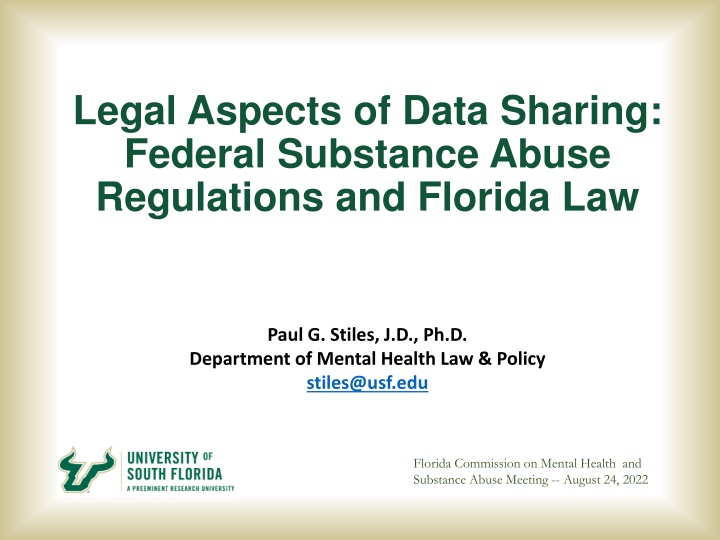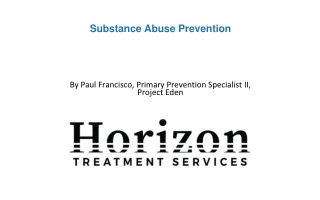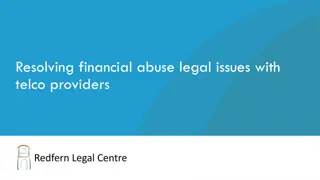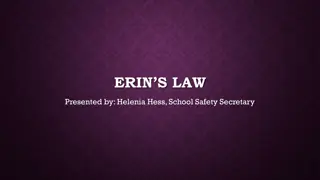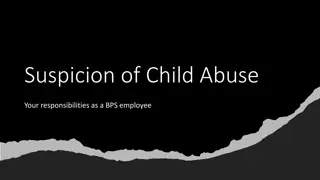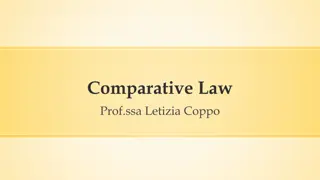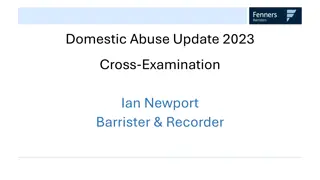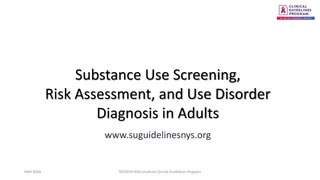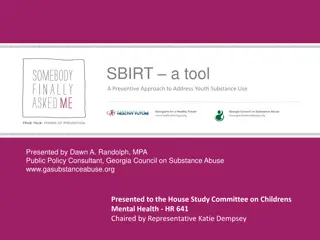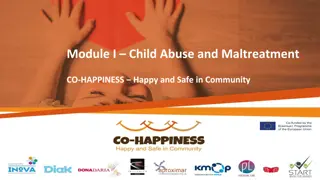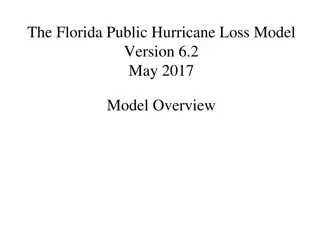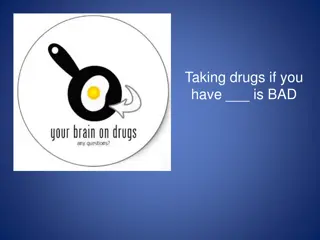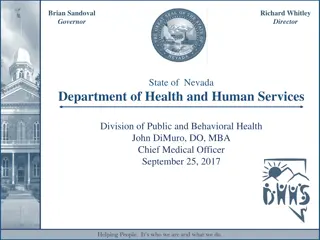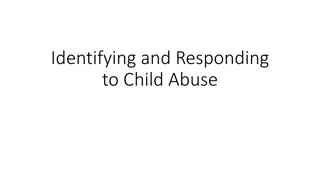Legal Aspects of Data Sharing in Federal Substance Abuse Regulations and Florida Law
This content discusses the regulations surrounding data sharing in federal substance abuse laws, particularly focusing on 42 CFR, Part 2 and Florida Medical Record law. It highlights the restrictions on disclosing patient substance abuse records, circumstances under which disclosure is allowed, and the confidentiality of patient records in Florida.
Download Presentation

Please find below an Image/Link to download the presentation.
The content on the website is provided AS IS for your information and personal use only. It may not be sold, licensed, or shared on other websites without obtaining consent from the author.If you encounter any issues during the download, it is possible that the publisher has removed the file from their server.
You are allowed to download the files provided on this website for personal or commercial use, subject to the condition that they are used lawfully. All files are the property of their respective owners.
The content on the website is provided AS IS for your information and personal use only. It may not be sold, licensed, or shared on other websites without obtaining consent from the author.
E N D
Presentation Transcript
Legal Aspects of Data Sharing: Federal Substance Abuse Regulations and Florida Law Paul G. Stiles, J.D., Ph.D. Department of Mental Health Law & Policy stiles@usf.edu Florida Commission on Mental Health and Substance Abuse Meeting -- August 24, 2022
Agenda HIPAA and FERPA (Ms. Hepp) This Presentation: 42 CFR, Part 2 Florida Medical Record law Florida Data Collaboratives Comprehensive Privacy Bill Resource Florida Commission on Mental Health and Substance Abuse Meeting -- August 24, 2022
42 CFR, Part 2 Prohibits the disclosure and use of patient substance abuse records unless certain circumstances exist. MUST MAY SHOULD MUST e.g., under HIPAA upon written authorization or to HHS for compliance review or enforcement action. MAY e.g., under HIPAA for health care operations, incidental use and disclosure, or public interest and benefit activities (including organ donation, research, etc). SHOULD e.g., under HIPAA for serious threat to health or safety? Part 2 specifically does not require disclosure under any circumstances (so it s a MAY ). Florida Commission on Mental Health and Substance Abuse Meeting -- August 24, 2022
42 CFR, Part 2, continued When may disclose: With patient consent or court orders authorizing disclosure Without patient consent Medical Emergencies Research (in accordance with HIPAA and other restrictions) To a business associate, etc To scientific researcher Audit and Evaluation So, data sharing is allowed with appropriate agreements and safeguards under 42 CFR Part 2 Florida Commission on Mental Health and Substance Abuse Meeting -- August 24, 2022
Florida Medical Records Fla Stats 395.3025 examination. (1) Any licensed facility shall, upon written request, furnish, in a timely manner to any person admitted therein for care and treatment or treated thereat, a true and correct copy of all patient records, (2) This section does not apply to [psychiatric hospitals] (3) This section does not apply to {substance abuse treatment] (4) Patient records are confidential and must not be disclosed without the consent of the patient or [legal representative], but appropriate disclosure may be made without such consent to: (a) Licensed facility personnel, attending physicians, or other health care practitioners and providers currently involved in the care or treatment of the patient for use only in connection with the treatment of the patient. (b) Licensed facility personnel only for administrative purposes or risk management and quality assurance functions. (c) The agency, for purposes of health care cost containment. Patient and personnel records; copies; Florida Commission on Mental Health and Substance Abuse Meeting -- August 24, 2022
Florida Data Collaboratives FL Stats 163.6 COLLABORATIVE CLIENT INFORMATION SYSTEMS 163.61 Agency defined. 163.62 Collaborative client information system; establishment. 163.63 Steering committee; security policy information sharing agreements. 163.64 Sharing of client information. 163.65 Agencies receiving government funding encouraged to participate. 163.62 Notwithstanding any general or special law to the contrary, the agencies of one or more local governments may establish a collaborative client information system. State agencies and private agencies may participate in the collaborative information system. Data related to the following areas may be included in the collaborative information system, although the system is not limited to only these types of information: criminal justice, juvenile justice, education, employment training, health, and human services. Collaborative client information system; establishment. Florida Commission on Mental Health and Substance Abuse Meeting -- August 24, 2022
Comprehensive FL Privacy Bill HB 9 was passed by House a few days before end of 2022 session, but died when Senate did not consider. Would have been only the 3rd state to pass comprehensive consumer privacy law (others CA and VA). Offered broad protections against disclosure, but allowed for exceptions (e.g. public health activities and purposes). Alleged sticking point House Bill allowed a private right of action, whereas Senate wanted only FL Attorney General to enforce the law. Will likely be raised again next year. Florida Commission on Mental Health and Substance Abuse Meeting -- August 24, 2022
Resource Actionable Intelligence for Social Policy (AISP) Actionable Intelligence for Social Policy (AISP) is an organization housed at the University of Pennsylvania that is focused on helping state and local governments collaborate and responsibly use data to improve lives. A recent AISP report, Finding a Way Forward: How to Create a Strong Legal Framework for Data Integration provides a roadmap (including legal templates) to support exchanging, linking, and using data across government agencies. Has established a network of local and state-wide data integration initiatives from across the country which can share insights, structures and legal agreements. https://aisp.upenn.edu Florida Commission on Mental Health and Substance Abuse Meeting -- August 24, 2022
